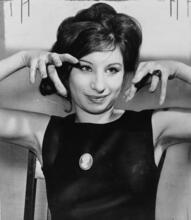Sylvia Sidney
Cropped screenshot of Sylvia Sidney from the trailer for the film The Wagons Roll at Night, 1941.
Courtesy of Warner Bros. Pictures, Inc./Wikimedia.
Feisty and opinionated, Sylvia Sidney in her prime was quite the opposite of the waiflike victim of social oppression she played in Hollywood’s Depression Era films. With her breakout film, City Streets, Sidney began playing a series of roles as troubled girls wrongfully convicted of crimes. While she disliked playing the victim, her vulnerability and working-class persona resonated with audiences. Over the course of her career, she worked with directors who included Fritz Lang and Alfred Hitchcock, and with leading men such as Humphrey Bogart, Gary Cooper, and Cary Grant. She earned an Oscar nomination for her performance in Summer Wishes, Winter Dreams, took on a comic role as the caseworker in Beetlejuice, and played a sympathetic grandmother in one of the first TV movies about AIDS, An Early Frost.
Feisty and opinionated, Sylvia Sidney in her prime was quite the opposite of the waiflike, even pathetic, victim of social oppression she played in Hollywood’s Depression Era films.
Early Life & Work
Born in the Bronx, New York, on August 8, 1910, Sylvia Kosow Sidney was the daughter of Jewish immigrants from Russia and Romania. She attended New York public schools, then the Theatre Guild School in Manhattan from 1921 to 1925.
Following her Broadway debut at age sixteen in The Squall, Sidney graduated to leading-role status and soon attracted Hollywood’s interest. She did a short stint with Fox Film—where she made Thru Different Eyes—before returning to Broadway. Back onstage in New York, she was discovered by Paramount mogul B. P. Schulberg, who offered her a contract. At Paramount, Sidney made the film that launched her career as a star, City Streets, directed by Rouben Mamoulian, who had taught and directed her at the Theatre Guild in New York. Shortly thereafter, she played the weepy pregnant girl in Joseph von Sternberg’s An American Tragedy and a similarly vulnerable character in King Vidor’s Street Scene.
Film Success
In the films Sidney made for Paramount during the 1930s, she was often typecast—against her will—as the wistful, teary-eyed sufferer of hardship. Her characters were either wrongly convicted of crimes, sent to jail, or both. Though she may have lamented being cast in such roles, Sidney’s screen personae exemplified heartfelt, working-class, urban heroes with whom similarly metropolitan Jewish audiences could identify.
A notoriously stubborn personality off-screen, Sidney worked and fought with such luminary directors as von Sternberg, Vidor, Fritz Lang (in whose first three American films she starred), Alfred Hitchcock (for whom she traveled to England), and William Wyler. Her onscreen leading men included Humphrey Bogart, James Cagney, Gary Cooper, Henry Fonda, Cary Grant, and Spencer Tracy, all of whom, like Sidney herself, were rising to stardom during the 1930s.
After her Paramount contract expired, Sidney signed with independent producer Walter Wanger. During this period, she was the first American star to work with Hitchcock—whom she found as difficult as his Hollywood counterparts—on Sabotage/A Woman Alone. Among the directors she worked with under Wanger, William K. Howard (with whom she made Mary Burns—Fugitive, 1935) remained her favorite.
In 1956, well beyond the heyday of the 1930s social injustice films with which she is so often identified, Sidney left Hollywood and returned to the New York stage. Among her numerous theatrical appearances in the 1950s and 1960s, she played the title role in Auntie Mame and Mrs. Kolowitz in Enter Laughing. Returning to film in 1973, she appeared in Summer Wishes, Winter Dreams as Joanne Woodward’s mother. Her comeback performance garnered her an Oscar nomination for best supporting actress. Later fans may recognize her from Beetlejuice (1988).
Personal Life
Sidney was married to publisher Bennett A. Cerf from 1935 to 1936, to actor Luther Adler from 1938 to 1947, and to Carlton Alsop from 1947 to 1950. Her second husband, the son of Jacob P. and Sarah Adler, was a member of the famous Adler acting clan of the Yiddish stage. Her son by Luther Adler, Jody, died in 1985 from Lou Gehrig’s disease (ALS) during Sidney’s filming of one of the first AIDS television films, An Early Frost. In the film, she played the sympathetic grandmother of a young man with AIDS. Sidney was involved in AIDS research and was a member of the national board of ALS.
Sidney wrote two books on one of her favorite pastimes, needlepoint: The Sylvia Sidney Needlepoint Book and The Sylvia Sidney Question and Answer Book on Needlepoint. She bred pug dogs at her home in Danbury, Connecticut.
Sylvia Sidney died in New York City on July 1, 1999.
Filmography
Accent on Youth (1935).
An American Tragedy (1931).
Andre's Mother (1991).
Beetlejuice (1988).
Behind the High Wall (1956).
Behold My Wife (1935).
Blood on the Sun (1945).
City Streets (1931).
Confessions of a Co-Ed (1931).
Damien: Omen II (1978).
Dead End (1937).
The Exorcist III (1990).
Fury (1936).
God Told Me So (1976).
Good Dame (1934).
Hammett (1983).
I Never Promised You a Rose Garden (1977).
Jennie Gerhardt (1933).
Ladies of the Big House (1931).
Love from a Stranger (1947).
Madame Butterfly (1932).
Mary Burns - Fugitive (1935).
Merrily We Go to Hell (1932).
The Miracle Man (1932).
Les Misérables (1952).
Mr. Ace (1946).
One Third of a Nation (1939).
Order of Death (1983).
Pick Up (1933).
Sabotage/A Woman Alone (1936).
The Searching Wind (1946).
Street Scene (1931).
Summer Wishes, Winter Dreams (1973).
Thirty Day Princess (1934).
The Trail of the Lonesome Pine (1936).
Thru Different Eyes (1929).
Used People (1993).
Violent Saturday (1955).
The Wagons Roll at Night (1941).
You and Me (1938).
You Only Live Once (1937).
Television
An Early Frost (1986).
F.D.R.: The Last Year (1980).
Finnegan Begin Again (1985).
The Gossip Columnist (1979).
Having It All (1982).
Pals (1987).
Raid on Entebbe (1976).
The Shadow Box (1980).
A Small Killing (1981).
Catsos, Gregory J.M. “An Interview with the Outspoken Sylvia Sidney.” Filmfax Magazine. 1990.
Current Biography. 1981.
Katz, Ephraim. The Film Encyclopedia. Crowell, 1979.
Laffel, Jeff. “Sylvia Sidney.” Films in Review 45, nos. 9–10 (September 1994): 2–19.
Quinlan, David. Quinlan’s Illustrated Registry of Film Stars. Henry Holt & Co, 1981.
Rigdon, Walter, ed. Who’s Who of the American Theatre. James H. Heineman, 1966.
Sidney, Sylvia. Clippings file. New York Public Library for the Performing Arts, and video interview by Robert Sklar, c. 1985. American Museum of the Moving Image, Astoria, Queens.
Thomas, Nicholas, ed. International Dictionary of Films and Filmmakers. Vol. 3: Actors and Actresses. Chicago: St. James Press, 1992.
Thomson, David. A Biographical Dictionary of Film. 3d ed. Knopf, 1994.
UJE.
WWIAJ. 1938.




